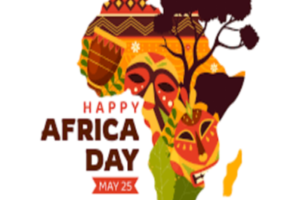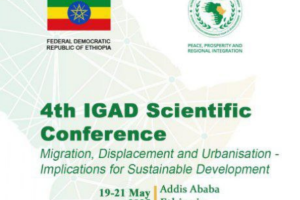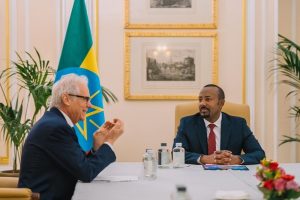For a considerable amount of time, Ethiopia and the United States have maintained a strategic and involved connection that is influenced by both common and sporadic issues. The two countries’ diplomatic ties have seen ups and downs in recent years, especially in light of Ethiopia’s domestic problems and the evolving foreign policy goals of the United States. Nonetheless, there appears to be a resurgence of interest as both nations understand how critical it is to fortify their relations in order to gain from each other.
For many years, the United States has been one of Ethiopia’s main sources of foreign aid, funding initiatives in the fields of development, health, and education that have positively impacted millions of Ethiopians.
However, amid Ethiopia’s recent internal turmoil, relations between the two countries were strained. As a result of tensions brought on by the U.S. government’s worries about violations of human rights and humanitarian access, changes in diplomatic and economic cooperation occurred. Notable fallout from these tensions included U.S. sanctions and Ethiopia’s exclusion from the African Growth and Opportunity Act (AGOA).
Despite these obstacles, there is a clear way to restart involvement. Ethiopia’s government, led by Prime Minister Abiy Ahmed, has been attempting to restore hurdles with the United States while highlighting Ethiopia’s aspirations for regional peace and stability. The United States now has the opportunity to reengage in a more positive manner because to the recent initiatives to facilitate humanitarian access and resolve internal issues.
One of the main areas Ethiopia and the United States can agree on is economic cooperation. There is room for more US investment in Ethiopia given its sizable market and aspirational development goals, particularly in fields like agriculture, infrastructure, and energy.
Improved commercial connections would be advantageous to both countries, and Ethiopia’s re-entry into AGOA may be crucial to increasing exports and employment.
Another pillar of Ethiopia-US relations is security cooperation. Both nations have a stake in stopping terrorism, dealing with the refugee crisis, and maintaining peace in surrounding countries like Somalia and Sudan because Ethiopia is essential to regional stability, especially in the Horn of Africa.
Ethiopia’s relationship with the US will be critical as it attempts to reconstruct and promote growth following years of domestic conflict. Ethiopia continues to be a vital ally of the United States in an area of strategic importance. The two nations are in a good position to deepen their relationship and work together to create a more peaceful and prosperous future with a renewed emphasis on communication and cooperation.
One of the significant areas of potential growth between Ethiopia and the U.S. lies in education within these 120 years of diplomatic relations.
In the recent U.S. Embassy and Addis Ababa University Presidential Seminar on the enduring of legacy and the impact of the U.S. government’s Point Four Program in Ethiopia, the U.S. Ambassador to Ethiopia, Ervin Massinga, said that the program has played a pivotal role for Ethiopia’s development journey, contributing its part in key sectors such as education, public health, and agriculture. It has been providing technical support for various sectors. Involves the United States working with the Ethiopian government to enhance and increase access to education in Ethiopia.
Between 1952 and 1961, the U.S. helped to establish Haramaya and Jimma agricultural colleges, which became universities, and the Gondar Health Institute (University of Gondar). Hence, the longstanding partnership between the two countries, particularly in the education sector, has contributed towards an enrolment rate increase, he said.
Currently, it has been assisting public universities to improve governance and quality of education. In response to the university system transition to autonomy, public diplomacy is helping university leaders adapt policy, practices, and organizational cultures to a more independent governance structure to encourage innovation, academic freedom, and others, the Ambassador added.
“The Americans from various universities are working with equivalent Ethiopians to adapt institutions that train and empower institutions building to contribute to building Ethiopians’ capacity and around the world. The Prof. Gebisa Ejeta story is exemplary for Ethiopians.”
He added that the U.S. government, in partnership with the Ministry of Education, has been contributing to improve and expand access to education.
Additionally, Ethiopia and the United States of America have steadily solidified their bilateral relations, according to Foreign Affairs State Minister Ambassador Mesganu Arega. He said a century-old bilateral tie between the two countries has also evolved through various historical contexts and heights. This is characterized by shared interest and collaborative efforts, the ambassador elaborated.
A farsighted approach that can tackle common challenges and advance mutually beneficial agendas is an absolute necessity for the protection of the national security interests of the two countries, the State Minister stressed.
“As we reflect upon our past, it is imperative to recognize the fundamental principles that have guided our partnership at its core. Ethiopia and the US have been characterized by a shared commitment to economic development, prosperity, maintenance of national regional stability, and promotion of democracy and human rights,” he noted.
The fight against terrorism and security cooperation is a key area of the bilateral relations between Ethiopia and the US, Ambassador Mesganu indicated.
Mesganu further underscored Ethiopia’s commitment to the maintenance of peace and security in the Horn of Africa as indispensable and one of the key spheres to collaborate with the US.
He added: “Fighting terrorism in the Horn of Africa is an important aspect of our relationship, and strengthening it requires a new impetus.”
Diplomatically, Ethiopia and the U.S. share common interests in global institutions like the United Nations. As Ethiopia holds a key position in African diplomacy, particularly through its involvement in the African Union, it remains a critical partner for the U.S. in addressing regional issues. This includes peacekeeping missions, counter-terrorism efforts, and humanitarian operations in conflict-prone areas.
Ethiopia’s role in regional peace and stability aligns with U.S. interests in ensuring a secure and prosperous Horn of Africa. As diplomatic relations continue to evolve, the mutual respect between Ethiopia and the U.S. will be key to unlocking new opportunities. With shared goals of development, security, and peace, both nations stand to benefit from a stronger, more collaborative partnership in the years to come.
It is well known that this year marks the 120th anniversary of the two nations’ diplomatic relations, which they commemorated with various activities.
BY EYUEL KIFLU
The Ethiopian Herald October 13/2024




